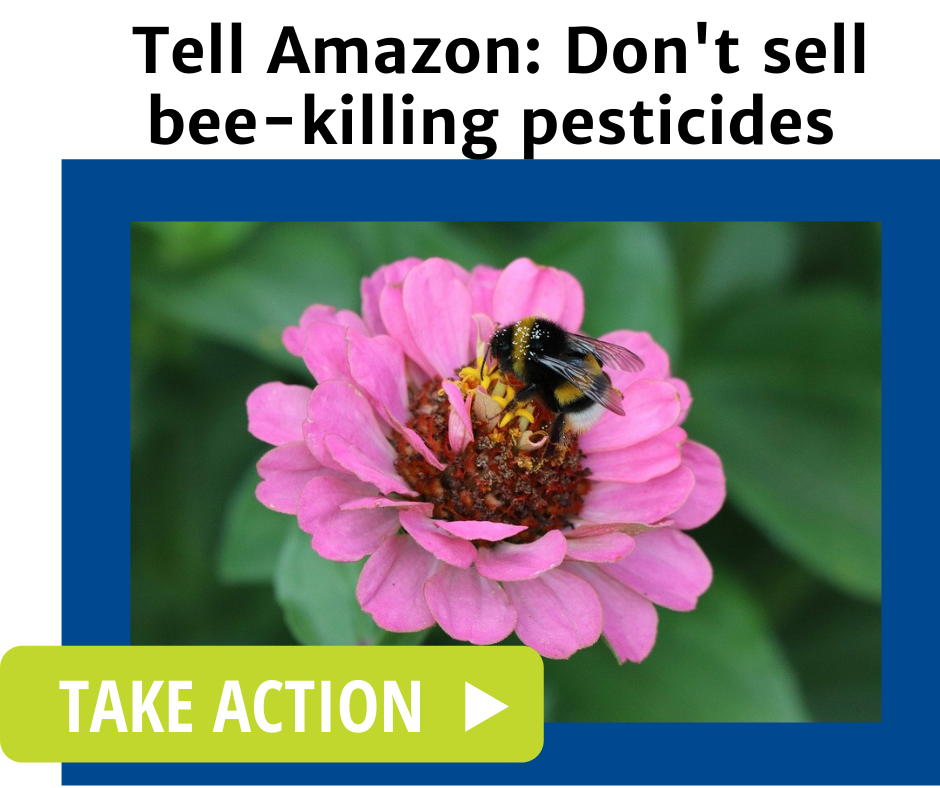
Friend,
With our bee populations in freefall, we all have to do our part to give bees a chance. But right now, Amazon is still selling a dangerous class of bee-killing pesticides.
We're working to change that.
Now's our chance to tell Amazon to stop selling bee-killing pesticides. Will you add your name?
Thanks for making it all possible,
Hannah Collazo
State Director
---------- Forwarded message ----------
From: Environment Colorado <[email protected]>
Date: Thu, Apr 15, 2021
Subject: Tell Amazon: Stop selling bee-killing pesticides
To: Friend <[email protected]>
 |
Friend,
Our bee populations are in rapid decline, and neonicotinoids -- a dangerous class of bee-killing pesticides -- aren't helping.1
But the next time you shop on Amazon, you could easily find products with these dangerous chemicals.2
We're close to losing 30 percent of our honeybees each year.3 And since we can't same-day ship a new species, we have to protect the pollinators we have left.
Amazon has a chance to help save the bees. Tell the online giant to take it.
Neonicotinoids, or "neonics," play a significant role in bee die-offs.4 According to some studies, these neurotoxic chemicals slowly kill bees, poison baby bees' brains, and diminish bees' ability to learn or forage for food.5,6
We need bees. Ninety percent of wild plants and 75 percent of all food crops need animal pollinators -- and bees are our best.7 They play a critical role in our planet's health, but our pesticides play a dangerous role in theirs.
If we want to make a difference in protecting bee populations, we have to get the world's No. 1 online marketplace to stop selling bee-killing pesticides.
Tell Amazon to take bee-killing pesticides off its shelves.
When it comes to maintaining our lawns and gardens, there are plenty of safe products on the market. Instead, Amazon still sells products with bee-killing neonics, such as imidacloprid.
Five years ago, conservationists across the country called on Home Depot and Lowe's to remove neonics from their shelves. And even though there's still work to be done on removing these bee-killing pesticides, it led to progress: Both companies have taken important steps to phase out neonics.8
Now, it's time to call on Amazon to do the same.
Urge Amazon to give bees a chance.
Thank you,
Hannah Collazo
State Director
1. Jim Daley, "Safety concerns mount over neonicotinoid pesticides in unexpected places," PBS, May 6, 2019.
2. Matthew Chayes, "Insecticides found in about 30% of Long Island groundwater samples, report says," Newsday, January 24, 2020.
3. Madie Sofia, "Honeybees Need Your Help, Honey," Short Wave on NPR, April 2, 2020.
4. Annette McGivney, "'Like sending bees to war': the deadly truth behind your almond milk obsession," The Guardian, January 8, 2020.
5. Roni Dengler, "Neonicotinoid pesticides are slowly killing bees," PBS, June 29, 2017.
6. "Pesticides impair baby bee brain development," Science Daily, March 3, 2020.
7. "Pollinators vital to our food supply under threat," Food and Agriculture Organization of the United Nations, last accessed February 9, 2020.
8. Rachel Layne, "Earth Day challenge for gardeners: Don't poison bees," April 18, 2019.
Donate today. A cleaner, greener future is within our reach. Your donation today can help us bring the vision we share a little closer to reality.
Environment Colorado, Inc.
1543 Wazee St., Suite 400, Denver, CO 80202, (303) 573-3871
Member questions or requests call 1-800-401-6511.
Facebook | Twitter
If you want us to stop sending you e-mail then follow this link -- Unsubscribe
